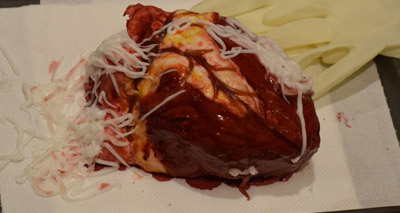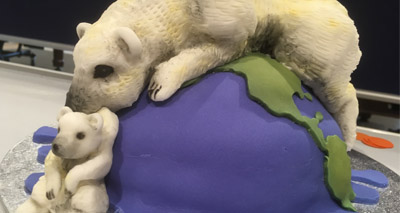Vet students get creative for science bake off
Heartworm bake wins ‘grossest cake’ accolade
A university cake off that went viral last year has seen a new round of impressive creations, with veterinary and biosciences students using their bakes to raise awareness of serious global issues.
The annual cake off was held last week at the University of Nottingham’s Sutton Bonington campus. Students raised £880 for Vets in the Community and the Terence Higgins Trust.
This year’s ‘grossest cake’ was a gruesome representation of a dog’s heart infected with the parasite Dirofilaria immitis. It was made by vet students Anna Burrows, Caitlin Glover, Chloe Tredinnick and Liberty Daly.
The annual cake off was held last week at the University of Nottingham’s Sutton Bonington campus. Students raised £880 for Vets in the Community and the Terence Higgins Trust.
This year’s ‘grossest cake’ was a gruesome representation of a dog’s heart infected with the parasite Dirofilaria immitis. It was made by vet students Anna Burrows, Caitlin Glover, Chloe Tredinnick and Liberty Daly.

“We chose to bake this cake as we wanted to make something that we could make look as realistic as possible and as gruesome,” they explained. “Our parasitology lecturer, Hany, inspired us to use the D. Immitis parasite as our theme to promote the message of how detrimental and possibly fatal some animal parasites can be!
“We had a great time baking it and enjoyed the looks of disgust that people who saw it gave. We promise it tastes better than it looks! Our key message to everyone is to PLEASE WORM YOUR PETS!”
The best overall winner was a stunningly detailed cake depicting planet earth with a giant polar bear and its cub clinging to an iceberg.
“We had a great time baking it and enjoyed the looks of disgust that people who saw it gave. We promise it tastes better than it looks! Our key message to everyone is to PLEASE WORM YOUR PETS!”
The best overall winner was a stunningly detailed cake depicting planet earth with a giant polar bear and its cub clinging to an iceberg.

Baker Hannah Cherry said: “I wanted to raise awareness of the impact that global warming is having on the ice caps and in turn the survival of polar bears. I love bears and really don't want to see these beautiful creatures disappear from the face of the earth, hence why my polar bear is trying to rescue her cub from the edge of a melting earth.
“I really enjoyed making this cake, I find working with sugar paste and fondant very therapeutic. It probably took me about 10 hours to make all in all.”
Other creations showed avian influenza H5N1, a turtle entangled in litter, Nemo and Dory alongside a plea to save marine life and a David Attenborough cake.
One of the judges, associate professor Dr Wendela Wapenaar, commented: “It’s been another great year for the Sutton Bonington Bakeoff. It was impressive to see how some bakers took on the challenging topics for this year; winning cakes were covering topics such as global warming, environmental pollution in addition to the more gory aspects of veterinary medicine.
“I wonder what Sir David Attenborough would have thought of his representation in 'Don't ignore Sir David's story...Help save Nemo and Dory'! We had better make sure we invite him next year!”
“I really enjoyed making this cake, I find working with sugar paste and fondant very therapeutic. It probably took me about 10 hours to make all in all.”
Other creations showed avian influenza H5N1, a turtle entangled in litter, Nemo and Dory alongside a plea to save marine life and a David Attenborough cake.
One of the judges, associate professor Dr Wendela Wapenaar, commented: “It’s been another great year for the Sutton Bonington Bakeoff. It was impressive to see how some bakers took on the challenging topics for this year; winning cakes were covering topics such as global warming, environmental pollution in addition to the more gory aspects of veterinary medicine.
“I wonder what Sir David Attenborough would have thought of his representation in 'Don't ignore Sir David's story...Help save Nemo and Dory'! We had better make sure we invite him next year!”
Image © University of Nottingham



 The veterinary mental health charity Vetlife is inviting the veterinary community to join it for a sponsored cold-water dip.
The veterinary mental health charity Vetlife is inviting the veterinary community to join it for a sponsored cold-water dip.